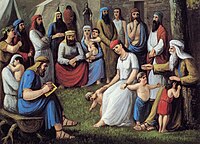Abinadi
This article uses texts from within a religion or faith system without referring to secondary sources that critically analyze them. (October 2011) |

According to the Book of Mormon, Abinadi (/əˈbɪnədaɪ/)[1] was a prophet who lived on the American continent about 150 BC. In the Book of Mormon account, Abinadi visited the court of King Noah at Lehi-Nephi, and pleaded for them to repent of their iniquity and live the law of Moses. Abinadi also gave Noah the message of the coming of the Lord Jesus Christ to earth in the flesh, to live among the children of men. Noah and his priests threatened Abinadi that unless he recalled all the words he had said against him and his priests, they would kill him. Abinadi stood by his words and Noah had him burned with fire. One of Noah's priests, Alma the Elder, adhered to Abinadi's message and eventually became a prophet himself.
Etymology
[edit]According to Todd Parker, the name "Abinadi" (Mosiah 11:20) appears to be symbolic. In Hebrew, ab means "father," abi means "my father," and nadi is "present with you," so the name Abinadi may reflect his mission; it may mean something like "my father is present with you." In the Book of Mormon account, the alleged reason for killing him was because Abinadi claimed that God would come down and would be with man (see Mosiah 15:1–7). That was the charge of blasphemy they finally used to put him to death (Mosiah 17:8).[2]
| Part of a series on |
| People in the Book of Mormon |
|---|
 |
Praise
[edit]M. Russell Ballard of the Quorum of the Twelve Apostles praised Abinadi for courage and obedience: “Abinadi infuriated wicked King Noah with his courageous testimony of the Lord Jesus Christ. Eventually this great missionary offered the ultimate sacrifice for his witness and faith but not before his pure testimony touched one believing heart. Alma, one of King Noah’s priests, ‘repented of his sins ... , [accepted Jesus as the Christ,] and went about privately among the people, and began to teach the words of Abinadi’ (Mosiah 18:1). Many were converted to the gospel of Jesus Christ as a direct result of Abinadi’s powerfully borne testimony of the Savior, believed by one soul, Alma.”[3]
While serving in the Seventy, Cree-L Kofford discussed Abinadi's influence: “What is there that is so special about Abinadi? Perhaps it was his total obedience as he went, presumably alone, among those whom he must have known would take his life, to deliver the word of the Lord and to cry repentance to the people. Perhaps it is the very fact that we know so little about him, or perhaps it was simply the way with which he faced the adversities which came into his life in such a straightforward, ‘square-to-the world’ way. Whatever the reason, Abinadi was and is special. His life, lived so long ago, still has the power to excite the mind and cause the pulse to pound.”[4][5]
Comparison to King Benjamin
[edit]According to Todd Parker, there are many similarities between the speeches of King Benjamin and Abinadi.[2]
See also
[edit]References
[edit]- ^ "Book of Mormon Pronunciation Guide", IPA-ified from «a-bĭn´a-dī»
- ^ a b Parker, Todd, Abinadi: The Man and the Message (Part 1), Maxwell Institute, BYU, pp. 1–2, archived from the original on 2016-03-05, retrieved 2016-01-18
- ^ M. Russell Ballard, "Pure Testimony", Liahona, November 2004, p. 41.
- ^ “Abinadi,” in Heroes from the Book of Mormon [1995], 69–70)
- ^ Book of Mormon Student Manual, (2009), 149–55.
Further reading
[edit]- Cramer, Lew W. (1992), "Abinadi", in Ludlow, Daniel H (ed.), Encyclopedia of Mormonism, New York: Macmillan Publishing, pp. 5–7, ISBN 0-02-879602-0, OCLC 24502140
- Matthews, Robert J. (1991). "Abinadi: the Prophet and Martyr". In Nyman, Monte S.; Tate, Charles D. Jr. (eds.). The Book of Mormon: Mosiah, Salvation Only Through Christ. Provo, Utah: Religious Studies Center, Brigham Young University. pp. 91–111. ISBN 0-8849-4816-1.
- Matthews, Robert J. (April 1992), "Abinadi: Prophet and Martyr", Ensign (LDS magazine)
- Nyman, Monte S. (1991). "Abinadi's Commentary on Isaiah". In Nyman, Monte S.; Tate, Charles D. Jr. (eds.). The Book of Mormon: Mosiah, Salvation Only Through Christ. Provo, Utah: Religious Studies Center, Brigham Young University. pp. 161–186. ISBN 0-8849-4816-1.
- Parker, Jared T. (2007). "Abinadi on the Father and the Son: Interpretation and Application". In Strathearn, Gaye; Swift, Charles (eds.). Living the Book of Mormon: Abiding by Its Precepts. Provo, Utah: Religious Studies Center, Brigham Young University. pp. 136–50. ISBN 978-1-59038-799-3.
- Petersen, Mark E. (1983), Alma and Abinadi, Deseret Book Co, ISBN 0877479593, archived from the original on 2013-07-04
- Welch, John (2011). The Legal Cases in the Book of Mormon. Provo, Utah: Brigham Young University Press; Neal A. Maxwell Institute for Religious Scholarship. ISBN 978-0842527125. OCLC 232358237. Archived from the original on 2013-12-19. Retrieved 2013-12-18.
